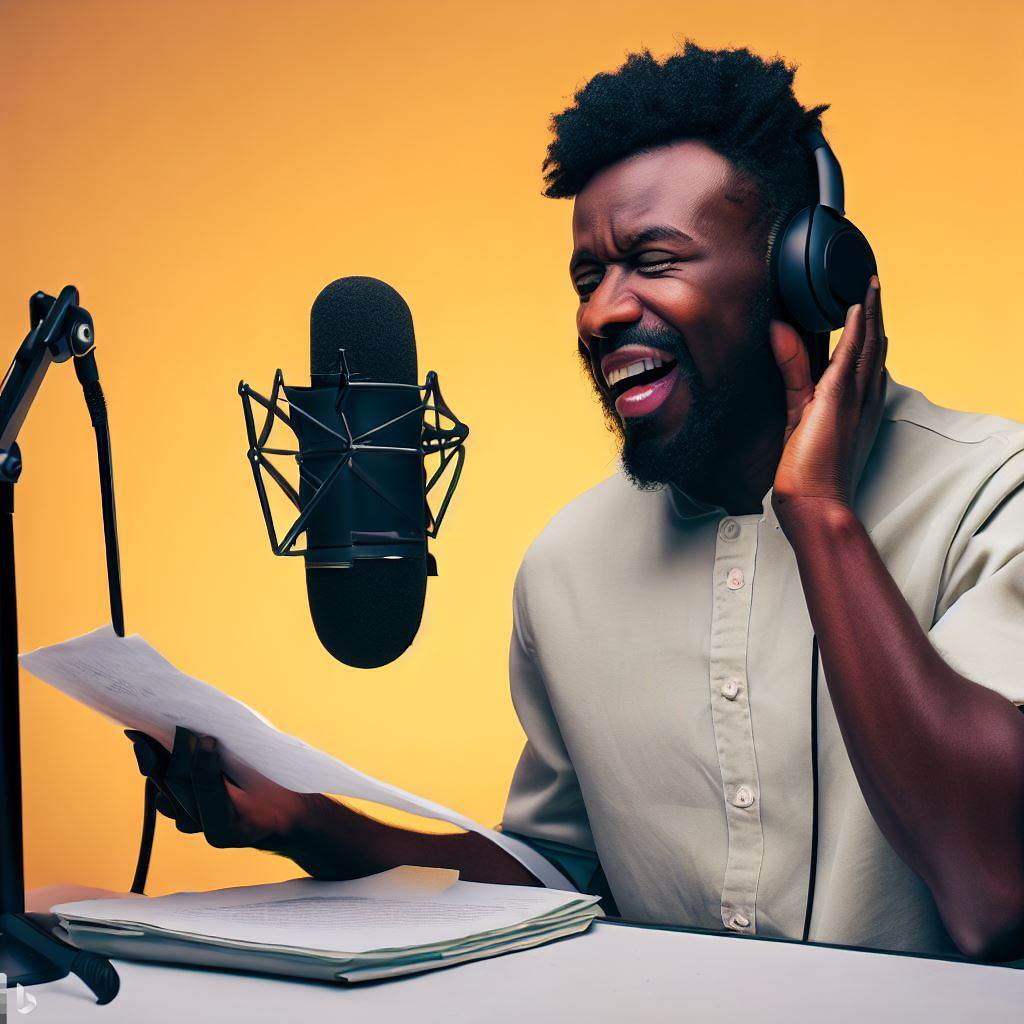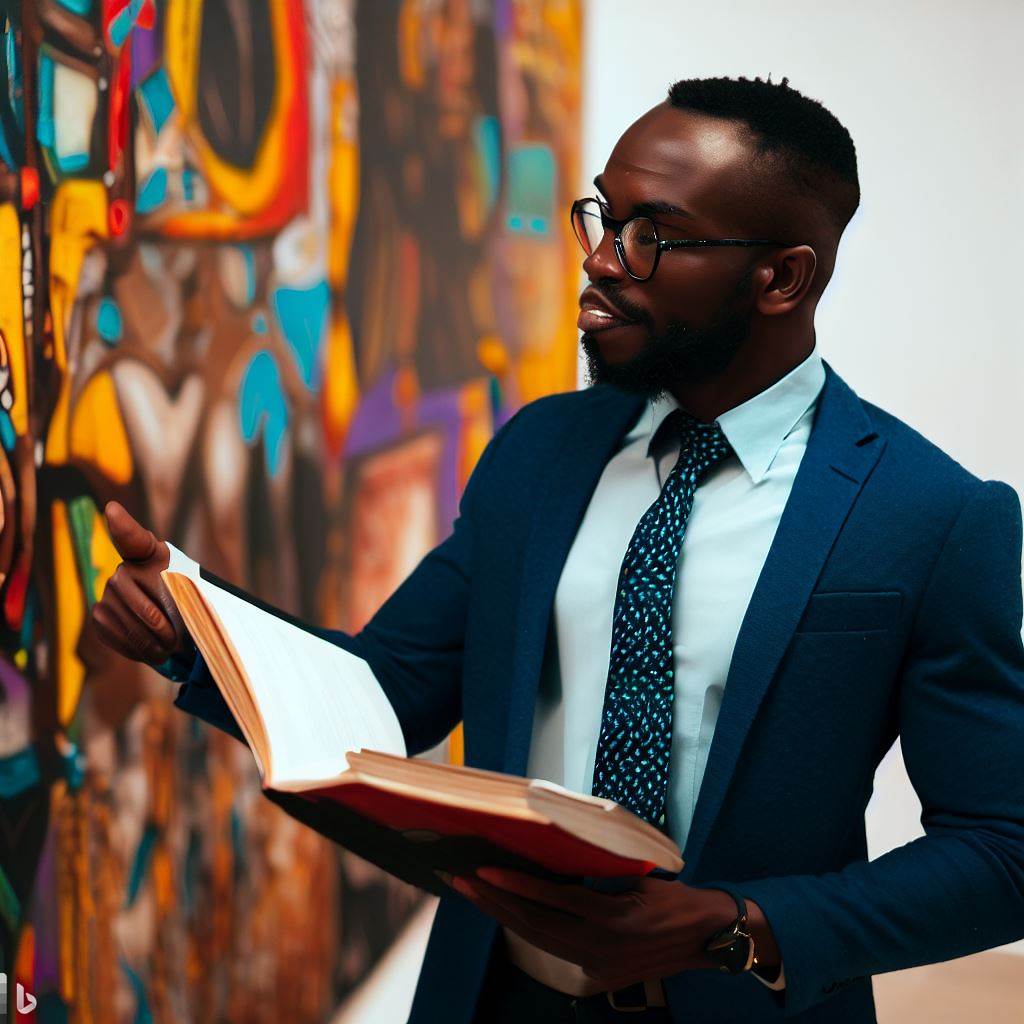Introduction
Voice acting is an essential component of various industries, including animation, commercials, and video games.
It involves using one’s voice to bring characters to life and convey emotions. Understanding voice acting rates in Nigeria is crucial for both actors and employers.
Voice acting refers to the act of using one’s voice to portray characters in various forms of media. It requires skilled vocal technique, versatility, and the ability to convey emotions effectively.
Voice acting plays a vital role in numerous industries. In animation, voice actors give life to characters by lending their voices, making them relatable and engaging.
In commercials, a persuasive voice can captivate audiences and effectively convey the message of the brand.
For video games, voice acting enhances the immersive experience, making players feel connected to the virtual world.
Voice actors use their skills to create memorable characters that resonate with audiences and bring scripts to life.
Their ability to project emotions through their voice is invaluable in conveying the intended message and connecting with the target audience.
Without voice acting, these industries would lack the depth and realism that draws people in.
Voice acting is an integral part of various industries, including animation, commercials, and video games.
Its significance lies in the creation of relatable characters and the effective communication of messages.
Understanding voice acting rates in Nigeria is essential for both aspiring voice actors and employers to ensure fair compensation and a thriving industry.
Overview of Voice Acting Rates in Nigeria
Voice acting rates in Nigeria vary depending on several factors such as experience, project length, complexity, and usage.
Different factors affecting voice acting rates
- Experience and skill level: Voice actors with more experience and higher skill levels generally command higher rates.
- Length and complexity of the project: Longer and more complex projects often require more time and effort, resulting in higher rates.
- Usage and distribution of the recorded material: Rates vary based on usage (commercials, radio, online) of the recorded material in Nigeria.
Comparison of voice acting rates in Nigeria to other countries
- In comparison to other countries, voice acting rates in Nigeria tend to be relatively lower.
- This could be attributed to factors such as the cost of living and the demand for voice actors in the country.
- In developed countries like the United States, Canada, and the United Kingdom, voice acting rates are generally higher due to a higher demand and a larger industry.
- In Nigeria, the voice acting industry grows, with rates rising to match demand for skilled actors.
Voice acting rates in Nigeria are influenced by various factors including experience, project complexity, length, and usage.
While rates may be relatively lower compared to other countries, the industry is expanding, and rates are expected to increase over time.
Amid rising demand, understanding voice acting’s value is vital for clients and actors in Nigeria’s growing industry.
By assessing rate factors against global benchmarks, industry navigation improves.
This ensures fair compensation for talent and successful projects.
Read: Networking for Success in Nigeria’s Voice Acting Industry
Factors Influencing Voice Acting Rates in Nigeria
1. Professionalism and reputation
Voice actors who have established themselves as professionals and have a reputable track record often command higher rates.
Clients are willing to pay more for experienced individuals who can deliver quality work.
2. Demand and competition in the industry
The level of demand for voice actors in Nigeria and the level of competition in the industry greatly influence rates.
When the demand is high and the competition is low, rates tend to be higher.
3. Economic factors
Economic conditions in Nigeria, such as inflation and the overall state of the economy, can impact voice acting rates.
In times of recession or economic instability, rates may be lower due to reduced budgets.
4. Negotiation skills
The ability to negotiate effectively plays a significant role in the rates voice actors can command.
Skilled negotiators can secure higher rates by showcasing their value and expertise to clients.
5. Specialization in specific genres or niches
Voice actors who specialize in specific genres or niches may be able to charge higher rates.
For example, those with expertise in commercial voiceovers or character acting for animations may be in high demand, allowing them to set higher rates.
These factors interact and contribute to the rates voice actors can expect to earn in Nigeria.
By understanding these influences, voice actors can better navigate the industry and negotiate fair compensation for their services.
Read: Opportunities and Challenges of Voice Acting in Nigeria

Understanding the different types of voice acting rates
Voice acting rates vary depending on the type of project and the agreement between the voice actor and the client.
It is important for voice actors in Nigeria to understand the different types of rates that exist in the industry.
By having this knowledge, they can negotiate fair pay and ensure that they are compensated appropriately for their work.
1. Hourly rates
- This is one of the most common types of voice acting rates.
- Voice actors charge a set amount per hour of work.
- The hourly rate can vary based on factors such as the actor’s experience, the complexity of the project, and the client’s budget.
2. Per-word or per-minute rates
- Some voice actors prefer to charge per word or per minute of recorded audio.
- This type of rate is often used for projects such as audiobooks, commercials, or video games, where the length of the recording is known in advance.
3. Flat fees for specific projects
- In certain cases, voice actors may charge a flat fee for a specific project, regardless of the time or effort involved.
- This type of rate is commonly used for projects with a predetermined scope, such as voicing a character for an animated series or narrating a documentary.
4. Royalties and residuals
- In some cases, voice actors may negotiate royalties or residuals as part of their payment.
- Royalties are a percentage of the revenue generated by the project, while residuals are ongoing payments based on its continued use.
- This type of payment structure is common in industries such as animation and video games.
Ultimately, voice actors in Nigeria should carefully consider the type of project, their level of expertise, and industry standards when determining their rates.
It is essential to negotiate fair pay that reflects the value of their work while being mindful of the client’s budget and requirements.
Consulting industry peers aids voice actors in navigating rate negotiations for fair compensation.
Read: How to Start Your Voice Acting Career in Nigeria
Examples of voice acting rates in Nigeria
In Nigeria, voice acting rates can vary depending on the type of project.
Here are some examples:
- Rates for commercial advertisements: For a 30-second commercial ad, voice actors can charge between ₦50,000 and ₦150,000 ($120 to $360).
- Rates for animations and video games: Voice actors working on animations and video games can earn between ₦70,000 and ₦200,000 ($170 to $480) per hour of recording.
- Rates for documentaries and narrations: These rates can range from ₦80,000 to ₦250,000 ($190 to $600) per hour, depending on the project’s budget and scope.
- Rates for e-learning and audiobooks: Voice actors specializing in these fields can charge between ₦40,000 and ₦100,000 ($95 to $240) per hour or a fixed rate per project.
It’s important to note that these rates are just guidelines and can vary depending on factors such as the voice actor’s experience, demand, and the complexity of the project.
Voice actors often negotiate rates based on the length of the recording, usage rights, and the reach of the project.
For instance, a voice actor might charge higher rates for a national television commercial compared to a local radio ad.
Additionally, some voice actors offer package deals or bulk rates for multiple projects or long-term collaborations.
To determine a fair rate, it’s crucial for both voice actors and clients to communicate openly and define the project’s requirements, usage terms, and budget.
Clients value voice actors’ expertise; they invest time in honing skills, using quality equipment, and continuous training.
Voice actors must set rates considering experience, time, and project potential.
Ultimately, finding a balance where both parties feel satisfied is key to building successful working relationships in the voice acting industry in Nigeria.
Tips for negotiating voice acting rates in Nigeria
In Nigeria’s competitive voice acting realm, knowing your value is essential.
Researching industry standards
- Research industry standards rigorously to gauge prevailing rates.
- Your experience and skills, honed over time, can’t go unnoticed and so emphasize your versatility; showcase a dynamic range of tones and accents.
- This sets you apart, making clients see your exceptional suitability.
Highlighting your experience and unique skills
To clinch a fair deal, express value beyond monetary terms. Clients seek reliability and effectiveness.
- Share success stories highlighting the impact of your voice.
- Captivate their attention with a portfolio brimming with accomplishments.
- Clear communication demonstrates your dedication.
- Timely responses build trust, fostering lasting relationships.
Demonstrating value to the client
- When it’s negotiation time, confidence is key.
- Stress your commitment to clients’ satisfaction while showcasing your dedication to bringing their vision to life.
- Flexibility is crucial; show openness to their ideas as this reinforces your professionalism and collaborative spirit.
- Adaptability resonates well and eases the negotiation process.
Building relationships with clients
- Relationships aren’t built overnight therefore, nurture connections with consistency.
- Address clients’ concerns empathetically.
- Go the extra mile to make them feel valued and remember, a satisfied client can translate into long-term collaborations.
- Networking also opens doors to referrals, expanding your reach.
Being flexible in negotiations
- Remember, negotiations are a two-way street.
- Craft win-win solutions but be prepared to compromise without compromising your worth.
- Offering options shows your willingness to meet in the middle.
- Propose tiered packages to give clients choices within their budget.
To sum up, navigating voice acting rate negotiations in Nigeria requires strategic finesse. Research grounds you in industry realities.
Experience and skills set you apart. Demonstrating value builds trust. Strong relationships lead to lasting collaborations.
Flexibility paves the way for successful talks. Armed with these insights, secure deals that respect your talent and effort.
Read: Creating a Winning Demo Reel for Voice Actors in Nigeria
Conclusion
In closing, understanding voice acting rates is crucial for both voice actors and clients in Nigeria.
By understanding voice acting rates, voice actors can ensure they are being fairly compensated for their work and avoid exploitation.
For clients, understanding voice acting rates allows them to budget appropriately and appreciate the value of voice actors’ contributions.
Voice actors should recognize the skills, time, and effort they invest in their craft and strive for fair compensation.
They should confidently assert their worth and negotiate rates that reflect their talent and experience.
The future looks promising for voice actors in Nigeria as the industry continues to grow and mature.
With more awareness and understanding of fair rates, voice actors can expect better opportunities and financial rewards for their work.
However, it is crucial for continued advocacy and collective efforts to ensure fair and sustainable rates in the long term.





Thank you so much for this, it was really helpful.
You are most definitely welcome.